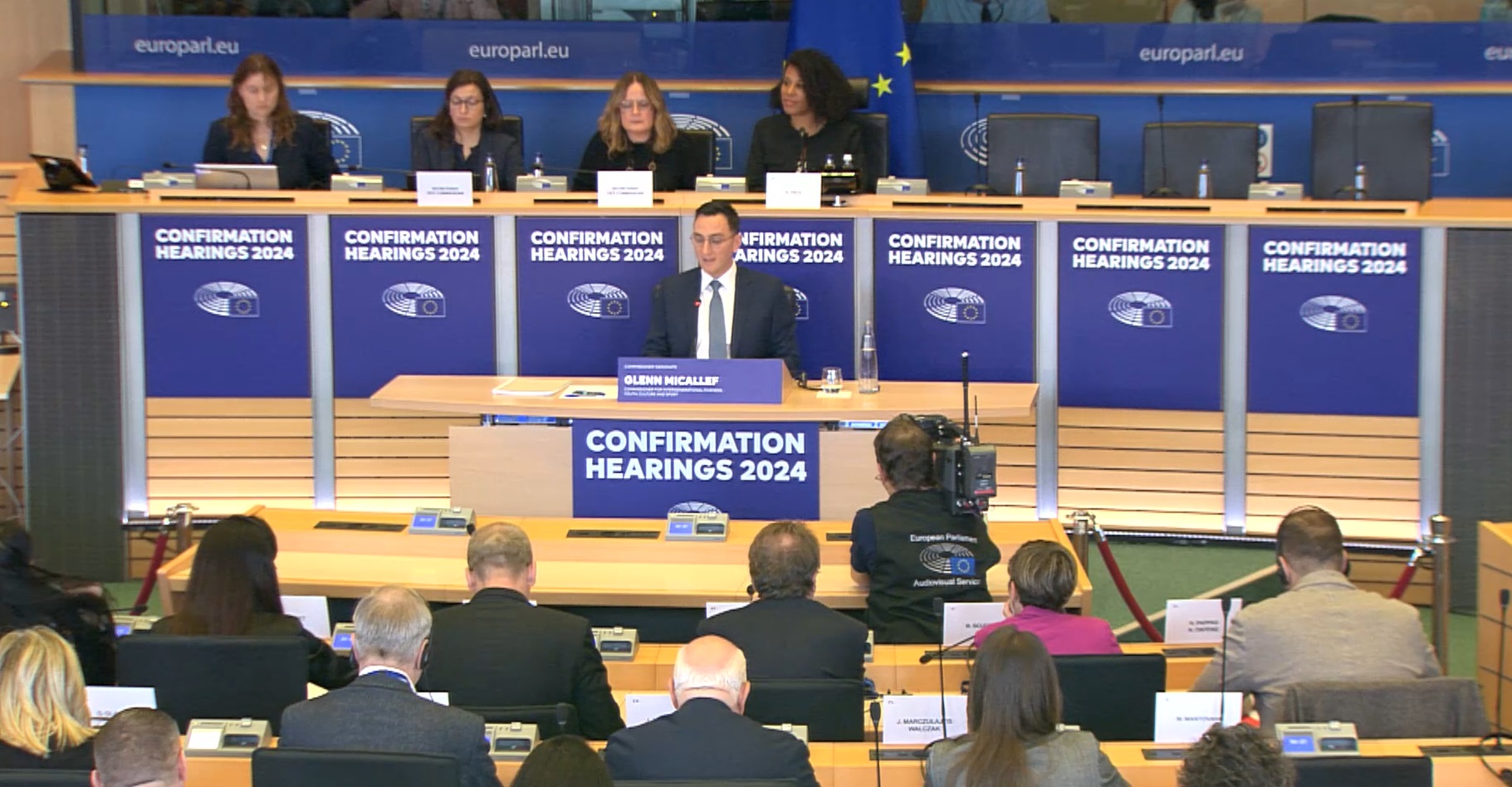2024-2025: developments and future perspectives for sport in the European Union
15/01/2025 – By Eva Jacomet, Head of the EU Affairs

Glenn Micallef, new European Commissioner for Sport, surrounded by the wonderful Eva and Hugo from Sport and Citizenship
A new work plan for sport 2024-2027 adopted by the Council of the European Union, the appointment of a new Commissioner for intergenerational fairness, youth, culture and sport Glenn Micallef, the start of a new European legislature: the second half of 2024 and the beginning of the new year brings its share of changes to the political treatment of sport in the European Union. Let’s take a look at what’s been happening in Europe over the last 6 months and what the impact will be in the future: what do these changes mean, and what do they augur?
New work plan on sport 2024-2027: an ambitious vision for the role of sport in the European Union
Adopted by the EU Council for Education, Youth, Culture and Sport on May 14, 2024, the EU Work Plan for Sport (2024-2027) sets out an ambitious strategy for the development of sport in the European Union. The document highlights three key priorities: integrity and values in sport, the socio-economic and sustainable dimensions of sport, and participation in sport and physical activity for health.
One of the guiding objectives of this plan is to strengthen the safety and integrity of sport in Europe, while promoting a sustainable, evidence-informed sports policy. Particular attention is also paid to increasing sports participation at all ages and improving accessibility for vulnerable groups, with the aim of promoting an active lifestyle that is respectful of the environment and conducive to social cohesion and active citizenship. Support for grassroots sport and health-promoting physical activity is another key priority, with an emphasis on volunteering.
The EU Work Plan also encourages investment in the sports sector, particularly in sustainable and accessible infrastructures, with a view to reducing the sector’s carbon footprint. It also highlights the European sport model as an example of transparent and ethical governance. Innovation and digitization in sport are identified as key drivers for health, performance, economic development and sustainability.

Priorities of the new Commissioner for Intergenerational Fairness, Youth, Culture and Sport, Glenn Micallef
Appointed in September 2024 and then confirmed following his hearing by the European Parliament’s CULT (Culture and Education) Committee in December, Glenn Micallef has presented an ambitious roadmap to strengthen the impact of sport on a European scale. Key objectives include
- Strengthening the European sports model. The Commissioner advocates a model based on solidarity and balance between top-level and amateur sport.
- Access to sport for all, with a particular focus on reducing inequalities of access, especially for women, LGBTIQ communities and disadvantaged groups.
- Combating the piracy of sporting events. Faced with the increase in online piracy, the Commissioner intends to strengthen cooperation between Member States and envisage specific regulations.
- Reinforcing the role of sport in European diplomacy, enabling the EU to strengthen its international partnerships and maximize the impact of major sporting events on the world stage.
Polish Presidency: recognizing the educational role of sport and promoting active lifestyles
In its program, the Polish Presidency of the European Union recognizes and advocates for the educational role of sport. Faced with the alarming decline in physical activity among children and young people, it intends to promote sport as an essential lever for physical and mental health. Conclusions will be presented to the Council, proposing concrete actions and cross-sector initiatives to encourage active lifestyles. At the same time, Poland wishes to open the debate on the role of athletes in defining sports development strategies, insisting on their central place in a more transparent and inclusive system.
With the adoption of the EU Work Plan for Sport 2024-2027, the appointment of Glenn Micallef as Commissioner for Intergenerational Equity, Youth, Culture and Sport, and the priorities of the Polish Presidency, the European Union is marking a turning point in its sports policy. Sport and Citizenship welcomes these advances and the fact that crucial issues such as the promotion of an active lifestyle, accessibility to sport, the fight against all forms of violence and discrimination, sustainability and social impact are now on the agenda. However, the association points out that it is essential to go further, by recognizing the transversal role of sport and strengthening European funding to support those involved in sport. Building on the European projects we lead and our convictions for a sustainable, safe, and inclusive sport that can educate and transmit civic values, Sport and Citizenship will continue to advocate these messages to the institutions and work towards a better recognition of the impact of sport in Europe.










 MEMBERSHIP
MEMBERSHIP CONTACT
CONTACT FACEBOOK
FACEBOOK